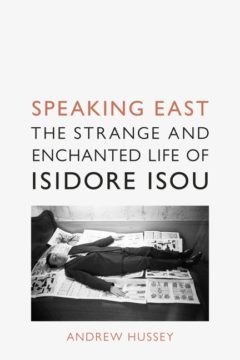Dennis Duncan at Literary Review:
 Nevertheless, when the Dadaist poet Tristan Tzara was buried at Montparnasse in the winter of 1963, Isou and his followers arrived uninvited at the cemetery and fought with the communists who had also come to pay their respects. As Isou began to make a speech, he was informed that Tzara’s family had wished for the funeral to pass in silence. Undeterred, he began to declaim a lettriste poem: ‘étli, tzara, jofué lochigran télebile sarkénidan.’
Nevertheless, when the Dadaist poet Tristan Tzara was buried at Montparnasse in the winter of 1963, Isou and his followers arrived uninvited at the cemetery and fought with the communists who had also come to pay their respects. As Isou began to make a speech, he was informed that Tzara’s family had wished for the funeral to pass in silence. Undeterred, he began to declaim a lettriste poem: ‘étli, tzara, jofué lochigran télebile sarkénidan.’
As Andrew Hussey puts it in his enthralling new biography, Isou is ‘grandiose, exasperating, self-regarding, brilliant, piercing and poetic, often all in the space of the same page’. Isou’s heroic period, however, occupied only a sliver of his life, a brief thrill of youthful self-confidence that lapsed precipitously into bitterness, petulance and a career churning out under-the-counter erotica with titles like Les Orgies d’un séducteur and Les Plaisirs d’une dépravée. In telling the whole story, Hussey is forced (and forces us) to endure the long, painful decline of a messianic narcissist, in and out of institutions, perceiving enemies on all sides and kicking out at them in bouts of hysterical autofiction.
more here.
